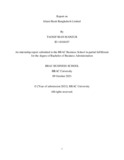Recruitment and selection procedure of Islami Bank Bangladesh Limited

View/
Date
2021-10Publisher
Brac UniversityAuthor
Manzur, Taosif RianMetadata
Show full item recordAbstract
In my internship report I tried to show the similarities and differences in Banking, both Islamic and conventional. My first objective is about the deposit system in Islamic Banking. As a financial intermediary, the Islamic Bank mobilizes savings from the public on the basis of mudaraba and provides financing to businesses on the same premise. Amanah can exist with or without consent. Amanah is defined as the goal of accepting someone's property or money for safekeeping. A trust is not a thing for which compensation must be paid, according to the usual norm. Wadiya money is a trust placed in the hands of the person who accepts it for safekeeping. If the property or money in safekeeping is damaged without the trustee's fault, the trustee is not accountable for any compensation. My second objective is about financing and investment in Islamic banking. The financier may possess real estate, such as a house, which he would then sell to the customer at a profit on a deferred payment basis, with payments made in installments as defined in the sale contract. The profit margin may be specified in the selling contract, in which case the entire value of the house will be paid in installments. Promoting housing certificates is a way to get a property as well as a financial instrument for a short-term investment. My third objective is about overdrafts/ credit cards in Islamic banking. Traditional banks allow customers to make interest-bearing overdrafts from their accounts. One of its forms is the usage of a credit card, in which the bank sets the customer's overdraft limit. My last objective is about investment in Islamic banking. I discussed it in detail on chapter 3 and highlighted some problems raised in an interview where in the case of Scheduled Banks listed by Bangladesh Bank, IBBL is required to save 5% of their deposit. On money deposited with Bangladesh Bank, the interest rate is fixed. IBBL does not consider this interest to be revenue, thus it transfers it to the Sadaqah Fund, lowering the bank's reserve.
